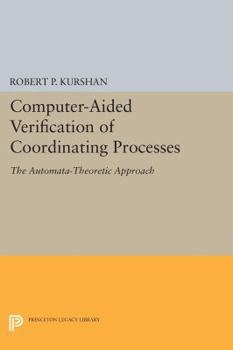Computer-Aided Verification of Coordinating Processes: The Automata-Theoretic Approach
Select Format
Select Condition 
Book Overview
Formal verification increasingly has become recognized as an answer to the problem of how to create ever more complex control systems, which nonetheless are required to behave reliably. To be acceptable in an industrial setting, formal verification must be highly algorithmic; to cope with design complexity, it must support a top-down design methodology that leads from an abstract design to its detailed implementation. That combination of requirements points directly to the widely recognized solution of automata-theoretic verification, on account of its expressiveness, computational complexity, and perhaps general utility as well.
This book develops the theory of automata-theoretic verification from its foundations, with a focus on algorithms and heuristics to reduce the computational complexity of analysis. It is suitable as a text for a one-or two-semester graduate course, and is recommended reading for anyone planning to use a verification tool, such as COSPAN or SMV. An extensive bibliography that points to the most recent sources, and extensive discussions of methodology and comparisons with other techniques, make this a useful resource for research or verification tool development, as well. Originally published in 1995. The Princeton Legacy Library uses the latest print-on-demand technology to again make available previously out-of-print books from the distinguished backlist of Princeton University Press. These editions preserve the original texts of these important books while presenting them in durable paperback and hardcover editions. The goal of the Princeton Legacy Library is to vastly increase access to the rich scholarly heritage found in the thousands of books published by Princeton University Press since its founding in 1905.Format:Paperback
Language:English
ISBN:0691606056
ISBN13:9780691606057
Release Date:July 2014
Publisher:Princeton University Press
Length:284 Pages
Weight:0.88 lbs.
Dimensions:0.6" x 6.1" x 9.2"
Related Subjects
Computers Computers & Technology Engineering Math Mathematics Science & Math TechnologyCustomer Reviews
0 rating





